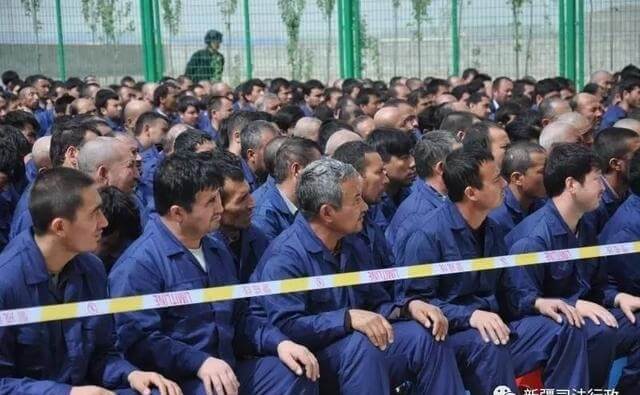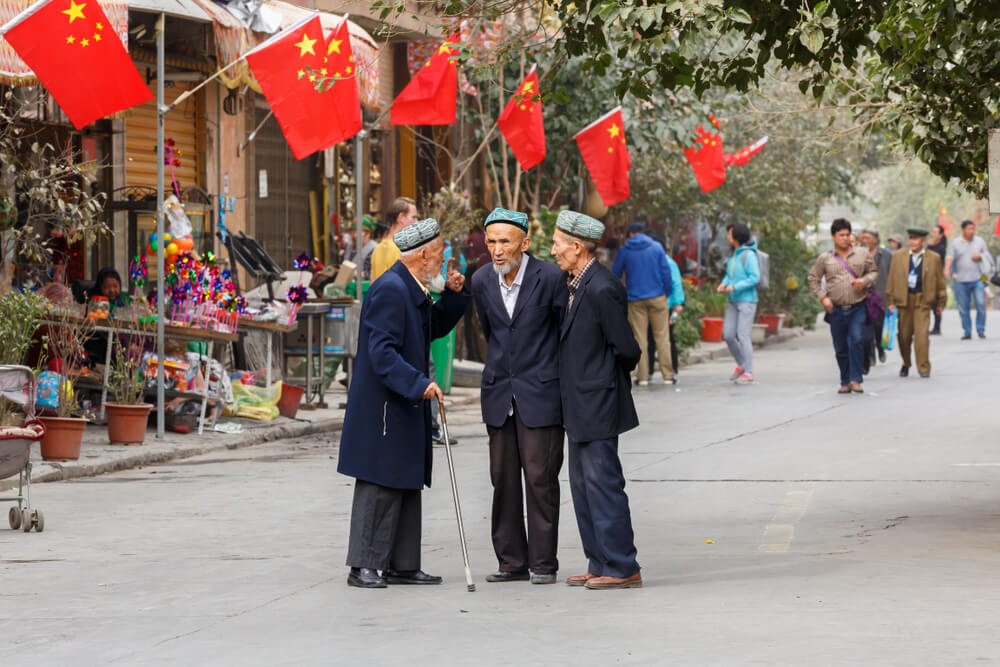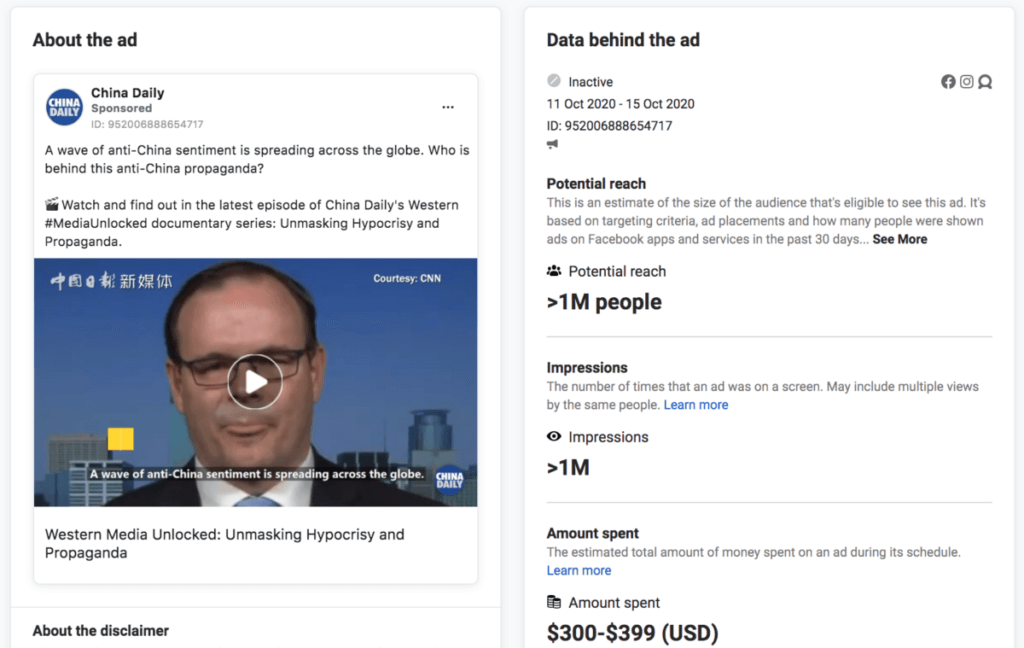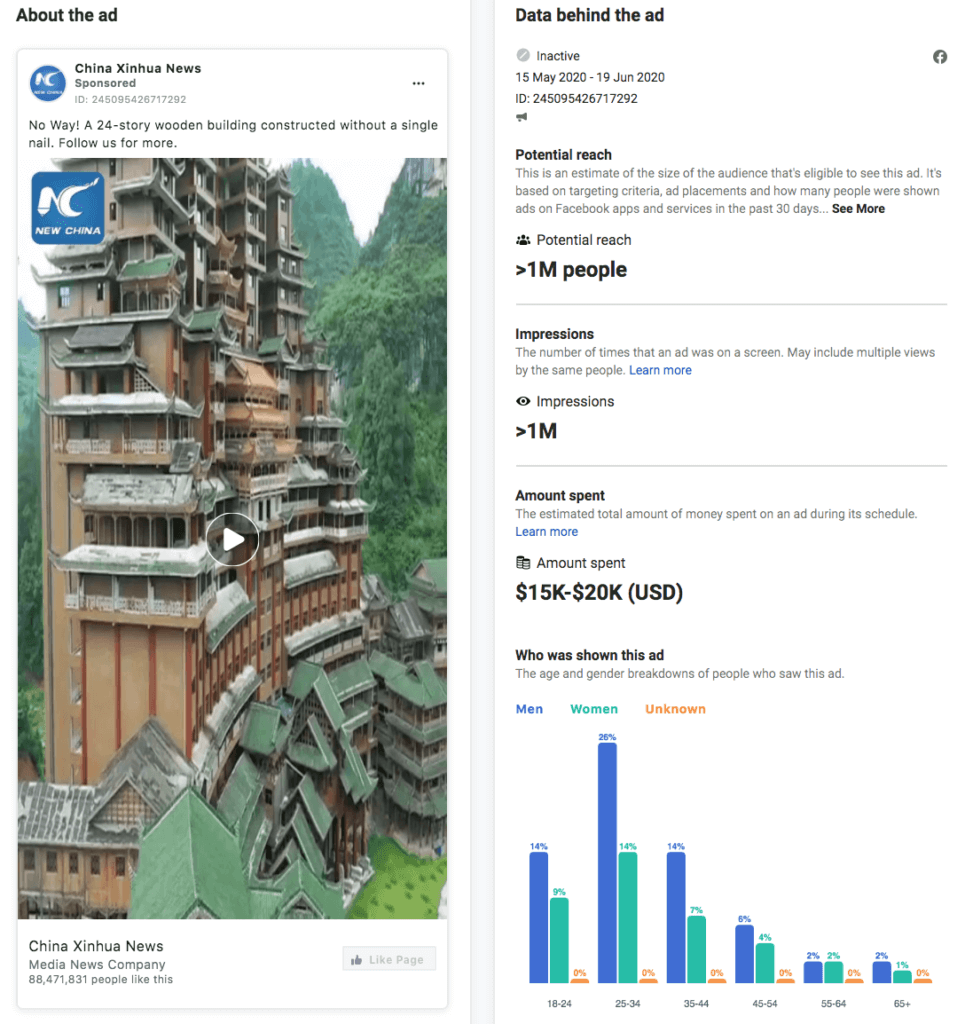[adrotate group=“15″]
A recent investigation revealed that social media giants such as Facebook and Twitter have facilitated the spread of “propaganda” and disinformation by Chinese state-owned media. This was done by downplaying the situation in China’s internment camps and denying what some have called “genocide” against the Uyghur Muslims from the Xinjiang province.
The strategic importance of Xinjiang is undeniable
The western province of Xinjiang, officially named Xinjiang Uygur Autonomous Region (XUAR), has had a long history of conflict between the Chinese authorities and the indigenous ethnic Uyghur population.
Xinjiang, as it is known today, is surrounded by eight countries, namely Mongolia, Russia, Kazakhstan, Kyrgyzstan, Tajikistan, Afghanistan, Pakistan as well as India, and after officially coming under Chinese rule in the 18th Century, it slowly began to evolve into one of the largest administrative regions in China.
Although the local population was mostly Uyghur until recently, young and technically qualified Han Chinese from the eastern provinces have come here as numerous urban development initiatives from the past years have vastly increased economic growth and, in turn, have created more jobs.
This Han immigration into the Xinjiang region combined with a clear consistency in choosing Han officials for the top positions of Xinjiang’s party bureaucracy further widened the divide between the Han Chinese – who make up the vast majority of the Chinese population – and the minorities.
This sense of inequality coupled with the increasingly restrictive state policies further increased the pressure on the Uyghurs to assimilate Chinese culture and language.
The reality of the Uyghur Muslims under the CCP

Former US secretary of state, Mike Pompeo, stepped forward and directly accused China of crimes against humanity.
“I have determined that the PRC [People’s Republic of China], under the direction and control of the CCP [Chinese Communist Party], has committed genocide against the predominantly Muslim Uyghurs and other ethnic and religious minority groups in Xinjiang,” he said in a statement back in January, less than 24 hours before leaving office. “I believe this genocide is ongoing, and that we are witnessing the systematic attempt to destroy Uyghurs by the Chinese party-state.“
He went on to add, “These crimes are ongoing and include: the arbitrary imprisonment or other severe deprivation of physical liberty of more than one million civilians, forced sterilization, torture of a large number of those arbitrarily detained, forced labor and the imposition of draconian restrictions on freedom of religion or belief, freedom of expression and freedom of movement. ”
Discrimination is nothing new for the Uyghur minority
It comes as no surprise that accusations of severely repressing Islamic practices in Xinjiang, especially among the Uyghur minority, have gained momentum in the past decades, with the Chinese government standing at the core of the problem.

Worth mentioning here are the violent street protests in the 1990s that left thousands of people dead after Uyghurs, Kirghiz, and Kazakhs protested against Chinese rule.
At that time, China defended itself by claiming that it had long faced an ongoing fight against insurgent violence, terrorism, and “criminal activities of ethnic splittists and other criminal offenders” and thus had no choice but to retaliate in kind.
The situation escalated in March 2008 amid overflowing enthusiasm regarding the incoming Beijing Olympics. That year, widespread Tibetan protests were met with a military response and quickly set off more world-wide protests against the oppression of Tibetans, Uyghurs, and other ethnic minorities.
A little over a year later, the July 2009 Ürümqi riots took place after a violent incident erupted between migrant Uyghurs and Han Chinese workers at a toy factory in Shaoguan, Guangdong, as a result of false allegations of sexual assault of a Han Chinese female.
The Ürümqi riots ended with 200 people dead – most of whom were Hans – around 1.700 people injured, 1.000 Uyghurs arrested, 9 executions, and at least 26 death sentences.
Facebook’s platform was used for disinformation
When Chinese media outlets paid Facebook and Twitter (both of which had been blocked in China since the 2009 Xinjiang riots) to promote “propaganda” videos that significantly downplayed the plight of Uyghur Muslims, millions of viewers ended up exposed to the onslaught of Chinese reports.
Those reports concerned subjects like Islamic terrorism in Xinjiang or the province’s Vocational Education and Training Centers which are actually closer to detention camps.
These Facebook ads paid by state-run outlets such as China Daily and CGTN hoped to persuade the West that the Xinjiang camps are not in gross violation of basic human rights.
All this took place, while also attempting to dismiss the rising concerns from several governmental bodies such as the United Nations (UN) as well as China experts. China Daily, for example, promoted a documentary that contained independent press reports from Xinjiang to as many as 1 million Facebook users by paying less than $400. The post mainly targeted users from Nepal, India, Myanmar, Indonesia, and other Asian nations and was promoted both on Facebook and Instagram in October 2020.
Facebook’s most ‘popular’ news pages

In this case, the advertised video claimed that Western “politicians, think tanks and the media work together to align narratives that drive public discussion and pervade the public consciousness often with malevolent intent”.
Another sponsored China Daily video also claimed that a report on Xinjiang’s Uyghur camps was “completely false” and “straight from the manual of Western media tricks”, while a third clip accused Western media of spreading “lies” and “disinformation” by insisting that “the tale of an oppressed Xinjiang is a myth Western media refuses to give up.”
“It is beyond disgusting that Facebook is taking money to promote Chinese state propaganda denying the reality that their state is engaged in crimes against humanity, against Uyghur Muslims,” stated Imran Ahmed, the Executive Chief of the Center for Countering Digital Hate, upon reading the findings presented in the article.
“It’s preposterous for them to claim they hadn’t seen that five of their six most liked news pages were driving division and whitewashing atrocities. No one will believe they hadn’t noticed. Governments will be alarmed that foreign states can openly purchase views for the propaganda of this kind. Facebook’s role in this should be taken into account by those currently drafting legislation to regulate tech companies. […] One of the most important parts of doing business is calibrating the impact of your business not just on your wallet but also on employees, on the communities you serve, and when you are as consequential a business as Facebook, on the world.”

This is not a technological or legal test, but a moral test – one that Facebook is failing.
It’s interesting to notice that just last month, the China Global Television Network (CGTN) had its license withdrawn by British media regulator Ofcom. The Chinese channel was accused of repeatedly breaching impartiality standards with its coverage of protests in Hong Kong and has been one of the media that paid Facebook to advertise a post promoting the advantages of “vocational training centers” in Xinjiang.
In retaliation, China banned BBC for its reporting on coronavirus and the persecution of the Uyghurs, with China’s National Radio and Television Administration (NRTA) saying that the reports about China were found to “seriously violate” broadcast guidelines, such as “the requirement that news should be truthful and fair” and not “harm China’s national interests”.
Facebook has also promoted several of CGTN’s posts that reported on Islamic terrorism in the Xinjiang province, which, according to a US government report from last year, is just an excuse of the CCP to suppress the Uyghurs.
In some of the cases highlighted by the article, Facebook eventually stopped running the adverts, finding them in breach of its terms and conditions which state that they should have been declared as political in the first place. However, Facebook stopped running the ads several days after the posts began to be promoted.
During this period, the paid adverts had already reached hundreds of thousands of users, and even now, after Facebook has finally stopped promoting them, most can still be found on the platform as non-sponsored content.
This can also be seen as a deliberate Facebook loophole which, instead of outright refusing all paid ads from state-controlled media, prefers to continue to rely on outside experts to flag potentially problematic posts.
These posts might not even end up being removed, or if they do eventually get deleted, the process would no doubt be done with a speed that might just not be prompt enough to avoid the damage.
A huge uptick in propaganda on social media
Coming from Facebook, this entire procedure can be seen as ironic since just last month, the social media giant has banned Australians from accessing news on its platform after the federal government proposed a news media code that threatened to force the £560 billion company to actually pay media companies for using their content.
The ban has since been reversed, but Facebook’s move drove the point across and demonstrated that news companies benefit much more from the social media platform than vice versa while also showing just how much the news sites’ traffic is affected if they happen to be cut off.
So it comes as no surprise that news outlets like CGTN, China Daily, China Xinhua News, the People’s Daily, and CCTV rely heavily on social media to promote their posts and reach their target audience.
A Social Blade ranking puts CGTN in 4th place in the Top 50 most liked Facebook pages sorted by likes count. But while most of its promoted posts are innocuous, some contain carefully crafted political propaganda whose aim is to try and convince Westerners that Xinjiang’s camps are not infringing on basic human rights, as it is vehemently maintained by the United Nations (UN).
“The Chinese government has gone from silence to promoting its policies as a model, with dangerous implications for human rights worldwide,” said Uyghur Human Rights Project (UHRP) project manager Nicole Morgret. “We’re seeing a huge uptick in the amount of propaganda that’s being produced by the Chinese state media, mostly in response to the much more elevated level of attention that’s being placed on the issue.”
Retaliation against the US?
Relations have visibly deteriorated between the two emerging global superpowers over issues such as the coronavirus pandemic and human rights. Former US secretary of state Mike Pompeo’s grave accusations of “genocide” have been met with more posts related to the Uyghur people and sponsored by China Daily.
The first post denied the Australian Strategic Policy Institute (ASPI) report of evidence related to the existence of 380 internment camps in Xinjiang by stating that “China Daily visited the alleged ‘camps’ in the Australian think tank ASPI’s reports on Xinjiang and found that its data, analysis, and conclusions are completely false.” Other sponsored posts put forced labor in the camps to doubt and accused Western media reports of disinformation.

The video criticized BBC reporting, accused Reuters and the Associated Press of “fake” articles, and attempted to discredit a New York Times investigation.
Unfortunately, Facebook’s Ad Library which was launched in 2019 as a means to make political marketing campaigns more transparent, no longer contains a record of these China Daily adverts. While the library shows all active ads, as well as inactive political and issue ads, non-political ads are removed from the library as soon as the advertiser pauses or stops running them.
This brings us to another post, this time by CGTN, which was promoted last month for a price between $200 and $299 and concentrated on “how Western media distorts #Xinjiang boarding schools.”
The ad ran between 22 January and 26 January and had approximately 400.000 views, among which the majority, respectively 15%, came from users from the Dhaka Division in Bangladesh.
Another post also by CGTN, this one for $300-399, titled “What is the real condition in boarding schools in Xinjiang? What changes have these schools brought to local students? CGTN’s Cui Hui’ao talked to some of the boarders at Shenta Middle School. #Xinjiang” reached almost 1 Million users, from which 37% were women aged 25-34. Facebook also took both these ads down on the same grounds that they were political in nature, something which CGTN once more failed to declare.
Another Chinese news agency that followed the trend is CCTV, having shared and promoted back in 2019 the CGTN documentary “Fighting Terrorism in Xinjiang” that supposedly “contains never-before-seen footage showing the tragedies and atrocities committed by terrorists in the past in northwest China’s Xinjiang Uygur Autonomous Region.”
This was followed in January 2019 by another post, for which CGTN paid approximately $100 to promote the following quote of a Malaysian diplomat: “What we saw during the visit was opposite to some Western media reports, and Xinjiang is seeking an effective way to counter extremism and terrorism.”
State-controlled tabloid Global Times also posted on Facebook a sponsored video titled, “Xinjiang center trainees graduate with hope for future” that shows the “vocational skills” of former Uyghurs detainees which they have supposedly learned in the camps.
The tabloid did not exclude Twitter from its strategy and promoted a video of its editor-in-chief criticizing politicians and journalists who’ve condemned the camps by saying that, “Their hands are in a way soiled with the blood of the Chinese people who died in violent attacks” planned by Uyghurs. He went on to add that, “A vast number of developing countries, including Muslim countries, understand and support governance in Xinjiang. It used to be a place suffering from terrorist violence. The region has regained peace and development.”
Tens of thousands of dollars spent on disinformation

The article goes on to describe how the biggest and most influential media organization in China, Xinhua News Agency, spent between $80.000 and $95.000 in no less than 9 ad campaigns in order to promote a more benign post that reads: “No way! A 24-story wooden building constructed without a single nail. Follow us for more.”
The video currently has 437.000 shares and over 3 million reactions and might have reached more than 1 million users for every one of those 9 campaigns.
As one of the largest news agencies in the world in terms of correspondents, China Xinhua News boasts an impressive following of more than 88 million users and of course, after a Facebook user ‘likes’ the page, that person will also receive news updates, including ones that promote CCP propaganda about the Xinjiang province. For instance, a June 2020 post said: “The so-called ‘Uyghur Human Rights Policy Act of 2020’ is an attempt by the United States to infringe on China’s sovereignty, a Russian scholar said,” while a July 2020 non-sponsored one said: “The 2019 report on international religious freedom issued by the United States claims that Xinjiang has bulldozed Uygur cemeteries in Aksu and Hotan prefectures. But is that true? Local residents tell you the story.”
China, second-largest country for Facebook ad revenue
It’s interesting to note that despite not being able to operate in China for over a decade, Facebook continues to derive significant revenue from the world’s most populous country.
This might also be one of the reasons behind the social media giant’s tolerance and approach when dealing with China-related matters especially since the company admitted in its 2018 annual report that it has generated “meaningful revenue from a limited number of resellers representing advertisers based in China.”
In fact, according to a new report by Pivotal Research analyst Brian Wieser, almost 10% of Facebook’s 2018 global ad revenue might have come from China, with Wieser estimating that number to be more than $5 billion. That makes it the second-largest country for Facebook ad revenue after the United States, which delivered a whopping $24.1 billion in advertising sales that year.
Two years later, in November 2020, Facebook reaffirmed its support of Chinese businesses and government agencies looking to promote their posts abroad by writing a short message in Chinese on local social network WeChat: “Facebook is committed to becoming the best marketing platform for Chinese companies going abroad.”

A Facebook spokesman emphasized Facebook’s stance on the matter as well as its “ongoing efforts to provide greater transparency around advertising”.
“Facebook does not allow political ads to run without a disclaimer providing more information about who is running them,” the spokesperson continues.
Truth is, most people are blind to ads as well as the fact that the first results that pop up on Google search contain advertising. Many don’t care about the fact that on Facebook, the user is the product, and IT is sold to the company or outlet.
However, ethnic cleansing, just for the sake of profit, while preaching equality in the free world, sounds like a complete discrepancy between what Facebook says, and what it actually does.
So, as users, we should be wary. We should be vigilant in order to separate propaganda and disinformation from fact.
Follow TechTheLead on Google News to get the news first.





















